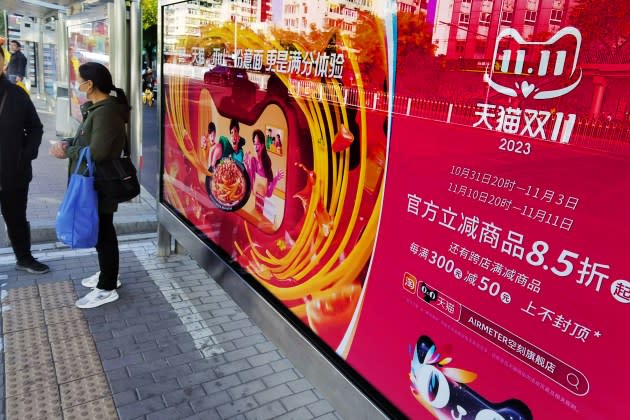Singles’ Day 2023: E-commerce Giants Ignite Price Wars as Bargain-hunters Take Charge

Against the backdrop of an evolving economic landscape, Chinese e-commerce players have embraced a quieter Singles’ Day holiday by offering steeper discounts.
According to third-party data agency Syntun, sales Friday and Saturday came in at 277.6 billion renminbi, or $38.5 billion, registering a year-on-year decline of 9.75 percent. The event generated 1.021 billion parcels, a decrease of around 16.65 percent compared to last year. The average customer unit price was 272.01 renminbi, or $37.82, an increase of 8.3 percent year-over-year.
More from WWD
Sales on Tmall, JD.com, and Pinduoduo accounted for 60.02 percent, 27.86 percent, and 7.34 percent, respectively, while other platforms accounted for 4.77 percent of overall sales.
As the world’s biggest online promotional event, this year’s Singles’ Day ran for over two weeks to Saturday.
The data reflects a current Chinese consumer sentiment of “willing to spend small for a bigger joy,” said Elena Gatti, managing director of Azoya Europe.
According to a recent Bain & Company survey of more than 3,000 Chinese consumers published last week, more than 77 percent of them plan to reduce or spend the same amount for Singles’ Day. Seventy-one percent of respondents said they plan to cut or maintain retail spending through 2023.
“Retailers are facing more than just discount fatigue,” said the Bain survey. “The spending caution related to the festival matches a more general mood of restraint.
“That value-conscious mentality was also a feature for Gen Z shoppers in the bigger cities and higher income brackets who haven’t yet built up the spending power of their older peers,” the report added.
As Alibaba’s first Singles’ Day since reorganization, its Taobao and Tmall branches recorded “positive year-on-year growth in gross merchandise value, order number, and participating merchants” compared to last year.
Other than offering 50 renminbi off for every 300-renminbi order placed on the platform, the biggest discount in recent years, the e-commerce giant tested a real-time price analysis feature. The platform used AI technology to tag products with “the lowest price” compared to competing e-commerce platforms, such as JD.com, Douyin, and Pinduoduo.
The transparent pricing strategy helped over 402 brands surpass the 100 million renminbi mark in terms of GMV. Tmall said 38,000 brands achieved 100 percent year-over-year growth in GMV.
Playing defense, JD.com launched its first in-house livestreaming program where its product manager-turned-anchor quoted lower prices based on that of its rivals, such as Tmall’s “Lipstick King” Austin Li.
An aggressive pricing strategy also lifted sales at new entrants Pinduoduo and Douyin. Neither platform released Singles’ Day sales results this year, but according to a recent analyst note from Citi, GMV at Pinduoduo is expected to grow in the “mid-to-high 20s,” in stark contrast with “less than 10 percent” at Alibaba and JD.com.
“Pinduoduo’s success reflects a strategy of directing its promotional firepower to simple and continuous low prices rather than complex, one-off discounts,” observed the Bain survey, referring to the platform’s “10 billion yuan subsidy” initiative that subsidizes steep discounts.
“Consumers are even now participating in bulk purchases for luxury and fashion products on Pinduoduo now,” observed Gatti. “We have noticed that brands such as Folli Follie, Coach, and Michael Kors benefit from a big presence across Pinduoduo’s women’s bag category. We guess these presences are mostly authorized by the brands.”
As for Douyin, the Chinese version of TikTok known for its livestreaming e-commerce operations, the platform recently revealed to local media outlets that its annual GMV reached two trillion renminbi, or $274 billion, from January to October, registering 60 percent growth year-over-year.
Luxury players, which traditionally use the online shopping festival to promote capsule collections paired with striking campaigns, have discreetly released special offers during Singles’ Day.
On Tmall, bargain hunters were thrilled to discover Prada loafers and Valentino Rockstud stilettos featured in flash sales at 30 to 50 percent off. Items like the Balenciaga x Adidas Destroyed Stan Smiths kicks quickly sold out.
According to the JD.com scoreboard, transaction volume for Dior, Tiffany & Co., and Bottega Veneta products increased over four times compared to last year’s Singles’ Day. Transaction volume at Valentino increased more than sixfold year-over-year.
“After long-suppressed spending on discretionary products, some consumers will make a move on their desired brands during Singles’ Day,” explained Gatti of the luxury spike.
This year’s Singles’ Day also demonstrated a strong interest in health and wellness categories, with athletic apparel, health supplements and pet care enjoying upticks in sales, according to WPIC, the Beijing-based e-commerce consulting agency.
“In fact, consumers are actively looking to ‘upgrade’ consumption in these categories to pursue quality,” said WPIC chief executive officer Jacob Cooke.
The wellness hype was framed by Tmall as the emerging “dopamine economy.”
“A lot of consumers, especially young consumers, are starting to pay attention to the emotional value of goods,” Liu Peng, the head of Tmall, told local media.
“More specifically, e-sports-related, outdoors cycling-related products and Lego have become the ‘holy trinity’ for male shoppers during Singles’ Day,” Liu added.
Best of WWD

